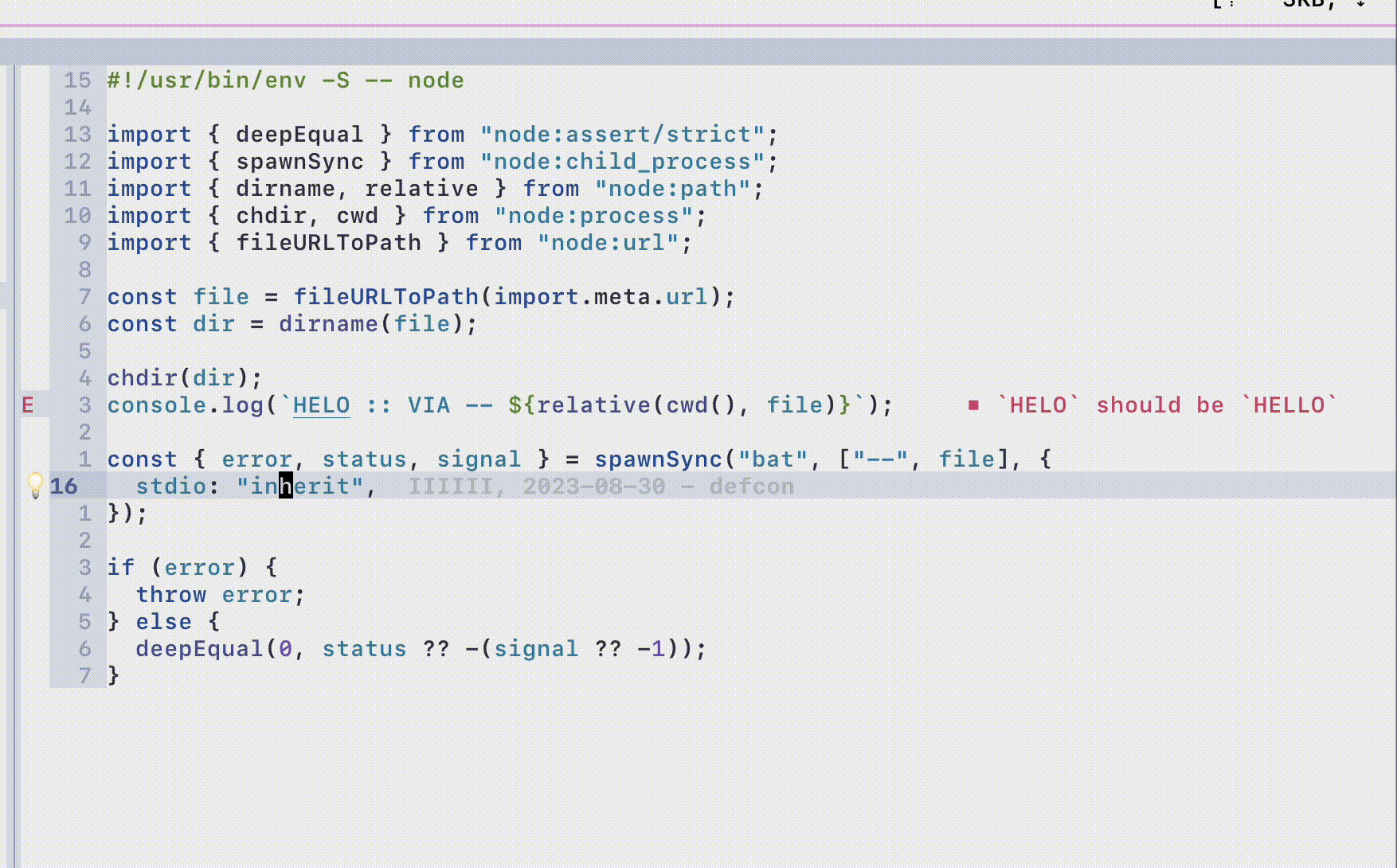-
Understanding
UNIXthrough the lens ofVIM -
VIMas a microcosm ofUNIXsystems
-
Wang, Hao
-
Life status: NEET, traveling the flat planet sphere
-
chadtree, NerdTree but chad
-
coq.nvim, CoC.nvim but coq
-
lua async await, coroutine based control flow for libuv
-
Files
-
Text
-
Processes
VIM⇆ Files are Text ⇆ Everything is a File ⇆ Processes communicate via Flies ⇆UNIX
-
Emergent property
-
VIM⇆ Recursion ⇆ Tree of Processes ⇆UNIX
-
HJKL👏 -
←↑↓→✋ -
Relative line positioning?
-
Delete 3 characters to the left?
From the moment I understood the weakness of my flesh, it disgusted me.
-
Prepped chicken, steamed rice, raw eggs, frozen lettuce
-
Blend
.into()smoothie -
Breakfast, lunch, dinner
Syntax ↔ Semantics
- Select part of syntax you want to alter → Change / Delete
-
Whatabout
emacs -
Whatabout
helix -
Whatabout
zed -
Whataboutatom -
Whatabout
vscode
UNIXis nothing without its userspace
I'd just like to interject for a moment.
What you're referring to as Linux, is in fact, GNU/Linux, or as I've recently taken to calling it, GNU plus Linux.
Linux is not an operating system unto itself, but rather another free component of a fully functioning GNU system made useful by the GNU corelibs, shell utilities and vital system components comprising a full OS as defined by POSIX.
Many computer users run a modified version of the GNU system every day, without realizing it.
Through a peculiar turn of events, the version of GNU which is widely used today is often called Linux, and many of its users are not aware that it is basically the GNU system, developed by the GNU Project.
There really is a Linux, and these people are using it, but it is just a part of the system they use.
Linux is the kernel: the program in the system that allocates the machine's resources to the other programs that you run.
The kernel is an essential part of an operating system, but useless by itself; it can only function in the context of a complete operating system.
Linux is normally used in combination with the GNU operating system: the whole system is basically GNU with Linux added, or GNU/Linux.
All the so-called Linux distributions are really distributions of GNU/Linux!
- Richard, Emacs.-
No TreeSitter
-
Informal
[Match]
Name = vtor
Driver = dummy
[Link]
RequiredForOnline = no
[Network]
DHCP = no
IPv6AcceptRA = no
Domains = ~onion ~exitserver {
server_name "";
include /usr/local/opt/nginx/conf/listen.nginx;
location / {
alias /usr/local/opt/nginx/index/;
sub_filter_once off;
sub_filter "@SCHEME" $scheme;
sub_filter "@HOST" $optimistic_host;
}
}Listen 80
<VirtualHost *:80>
DocumentRoot "/www/example1"
ServerName www.example.com
</VirtualHost>
<VirtualHost *:80>
DocumentRoot "/www/example2"
ServerName www.example.org
# Other directives here
</VirtualHost>-
"…"⇒CI" -
'…'⇒CI' -
<…>⇒CI> -
(…)⇒CI) -
{…}⇒CI} -
Consecutive "word" characters
/[A-z1-9_]+/⇒CIw -
Not whitespace characters
[^s]+⇒CIW
std{in,out,err}are files too
-
'shell' 'sh' string (default $SHELL or "sh", Win32: "cmd.exe") -
:help grep -
:help ctags -
:help make -
:help unnamed -
:help terminal
-
A TCP socket is a file
-
HTTP is a text protocol
-
bash→socat→bashrecursion
#!/usr/bin/env -S -- bash -Eeu -O dotglob -O nullglob -O extglob -O failglob -O globstar
set -o pipefail
ADDR='127.0.0.1'
PORT='8888'
if [[ -t 0 ]]; then
printf -- '%q ' curl -- "http://$ADDR":"$PORT"
printf -- '\n'
exec -- socat TCP-LISTEN:"$PORT,bind=$ADDR",reuseaddr,fork EXEC:"$0"
fi
tee <<-EOF
HTTP/1.1 200 OK
EOF
fortune | cowsay
gay <"$0" >&2-
chroot: before / after file system isolation -
ip netns exec: before / after network isolation -
ssh
bash -> ssh -> sshd -> bash
- PID 1
-
MacOS
-
Some BSDs
-+= 00001 root /sbin/launchd
|--= 00490 root /usr/libexec/logd
|--= 00491 root /usr/libexec/smd
|--= 00492 root /usr/libexec/UserEventAgent (System)
|--= 00494 root /System/Library/PrivateFrameworks/Uninstall.framework/Resources/uninst
|--= 00495 root /System/Library/Frameworks/CoreServices.framework/Versions/A/Framework
|--= 00496 root /System/Library/PrivateFrameworks/MediaRemote.framework/Support/mediar
|-+= 00499 root /usr/sbin/systemstats --daemon
| \--- 00769 root /usr/sbin/systemstats --logger-helper /private/var/db/systemstats- Good Linux distributions
systemd,1
|-5/flow_checks,841 --daemon --http-prefix=/ntop --disable-login=1
|-agetty,971 -o -p -- \\u --noclear tty1 linux
|-chronyd,777
|-cron,944 -f -P
|-dbus-daemon,603 --system --address=systemd: --nofork --nopidfile --systemd-activati
|-dnsmasq,1137 --conf-file=/run/local/dnsmasq/wg0/dnsmasq.conf
|-dnsmasq,1468 --conf-file=/run/local/dnsmasq/enp1s0/dnsmasq.conf
|-haproxy,967 -Ws -f /etc/haproxy/haproxy.cfg -p /run/haproxy.pid -f /usr/local/opt/h
| `-haproxy,974 -Ws -f /etc/haproxy/haproxy.cfg -p /run/haproxy.pid -f /usr/local/o
|-irqbalance,608 --foreground-
NVIMleaf -
Tree of Processes
\-+= 08871 iiiiii nvim
\-+= 08872 iiiiii nvim --embed
|--= 08873 iiiiii /Library/Developer/CommandLineTools/Library/Frameworks/Python3.fr
|--= 08874 iiiiii /Users/iiiiii/.config/nvim/pack/modules/start/chadtree/.vars/runt
|-+= 08875 iiiiii /Users/iiiiii/.config/nvim/pack/modules/start/coq_nvim/.vars/runt
| \-+- 09191 iiiiii /Users/iiiiii/Library/Preferences/nvim/pack/modules/start/coq_n
| |-+- 09198 iiiiii /Users/iiiiii/Library/Preferences/nvim/pack/modules/start/coq
| | \--- 09233 iiiiii /Users/iiiiii/Library/Preferences/nvim/pack/modules/start/c
| \--- 86848 iiiiii /Users/iiiiii/Library/Preferences/nvim/pack/modules/start/coq
|--= 08882 iiiiii /Users/iiiiii/Library/Preferences/nvim/var/bin/typos-lsp
|-+= 08901 iiiiii /Users/iiiiii/.local/share/.codeium/bin/3dee3c5d9fe70aff1993c1a94
| \--- 08924 iiiiii /Users/iiiiii/.local/share/.codeium/bin/3dee3c5d9fe70aff1993c1a
|--= 09011 iiiiii /Users/iiiiii/.local/asdf/installs/nodejs/20.8.0/bin/node /Users/
|--= 09151 iiiiii /Users/iiiiii/Library/Preferences/nvim/var/bin/marksman server
\--= 09152 iiiiii /Users/iiiiii/Library/Preferences/nvim/var/lib/ltex-ls/jdk-11.0.1-
nvim --embed?? -
Plugins
-
LSP servers
- Tini, S6, supervisord, etc
podman-init,1 -- docker-entrypoint.sh postgres
`-postgres,2
|-postgres,59
|-postgres,60
|-postgres,62
|-postgres,63
|-postgres,64
|-postgres,65
`-postgres,69-
HIER (Filesystem Hierarchy Standard) -
XDG
$XDG_CONFIG_HOME/nvim,
$XDG_CONFIG_DIRS[1]/nvim,
$XDG_CONFIG_DIRS[2]/nvim,
…
$XDG_DATA_HOME/nvim[-data]/site,
$XDG_DATA_DIRS[1]/nvim/site,
$XDG_DATA_DIRS[2]/nvim/site,
…
$VIMRUNTIME,
…
$XDG_DATA_DIRS[2]/nvim/site/after,
$XDG_DATA_DIRS[1]/nvim/site/after,
$XDG_DATA_HOME/nvim[-data]/site/after,
…
$XDG_CONFIG_DIRS[2]/nvim/after,
$XDG_CONFIG_DIRS[1]/nvim/after,
$XDG_CONFIG_HOME/nvim/after"/etc/systemd/system.control/* ~/.config/systemd/user.control/*
/run/systemd/system.control/* $XDG_RUNTIME_DIR/systemd/user.control/*
/run/systemd/transient/* $XDG_RUNTIME_DIR/systemd/transient/*
/run/systemd/generator.early/* $XDG_RUNTIME_DIR/systemd/generator.early/*
/etc/systemd/system/* ~/.config/systemd/user/*
/etc/systemd/system.attached/* $XDG_CONFIG_DIRS/systemd/user/*
/run/systemd/system/* /etc/systemd/user/*
/run/systemd/system.attached/* $XDG_RUNTIME_DIR/systemd/user/*
/run/systemd/generator/* /run/systemd/user/*
. $XDG_RUNTIME_DIR/systemd/generator/*
. $XDG_DATA_HOME/systemd/user/*
. $XDG_DATA_DIRS/systemd/user/*
… …
/usr/lib/systemd/system/* /usr/lib/systemd/user/*
/run/systemd/generator.late/* $XDG_RUNTIME_DIR/systemd/generator.late/*-
Most
AmericanUNIX problem solver -
POSIX standard
-
Text templating language
-
Somehow only data structure is list
-
Gratuitous
system(const char *command) -
No loops, only recursion
-
Everything is a file
-
Files are mostly text
-
Processes communicate via files
https://github.com/ms-jpq/vim.conf-2023
-
Planning on moving from Vancouver to Seattle
-
TN work VISA needed, since I'm Canadian






